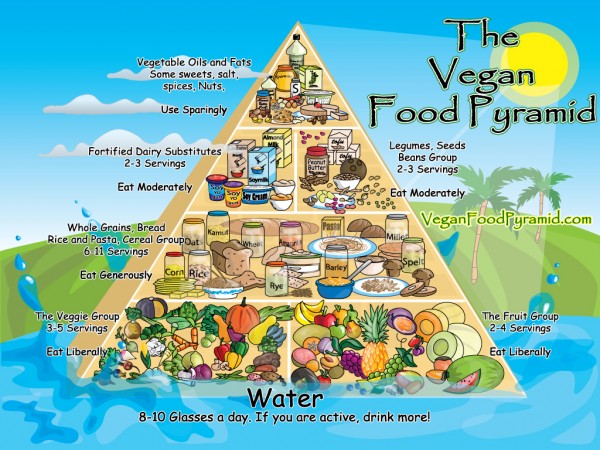Try the New Food Groups and discover a healthier way to live!
This no-cholesterol, low-fat plan supplies all of an average adult’s daily nutritional requirements, including substantial amounts of fiber. Look for foods that are non GMO (genetically engineered) and pesticide free. Be sure to include a good source of vitamin B12, such as fortified cereals or vitamin supplements.
Fruit3 or more servings a day |
Legumes2 or more servings a day |
Whole Grains5 or more servings a day Nuts, seeds, essential oils1 or 2 servings a day This groups includes peanuts and almonds , avocados, various nuts and seeds and oils such as olive oil, sunflower, safflower , flax or sesame seed oils seed or safflower. Serving size: 12 almonds, 16 peanuts, 2T peanut butter, 1T oil or vegan margarine |
Vegetables4 or more servings a day |
Many of us grew up with the USDA’s old Basic Four food groups, first introduced in 1956. The passage of time has seen an increase in our knowledge about the importance of fiber, the health risks of cholesterol and fats, and the disease-preventive power of many nutrients found exclusively in plant-based foods. Enlightened physicians such as Physicians for Responsible Medecine have extensively studied the benefits of a plant based diet and demonstrated that the plant kingdom provides excellent sources of the nutrients once falsely (or conveniently) believed to be only found in meat and dairy products—namely, protein and calcium. Truly the best form of calcium is daily exercise that enables a natural release in your body.
Because of the overwhelming evidence that a meat and dairy diet contributes to the onset of many metabolistic disorders, heart and vascular conditions and cancers, the USDA revised its recommendations with the Food Guide Pyramid, a plan that reduced the prominence of animal products and vegetable fats. What they are not telling you is that regular consumption of such foods—even in lower quantities—poses serious health risks.
The USDA is not telling you because the truth about the risks of an animal based diet is very inconvenient, and because they are tied to the financial and political interests of meat, dairy and grain agricultural giants who spend huge amount of money buying the favors of our Congress and Senate.
The major killers of Americans—heart disease, cancer, and stroke—have a dramatically lower incidence among people consuming primarily plant-based diets. Weight problems—a contributor to a host of health problems— as well as diabetes can also be brought under control by following the New Four Food Group recommendations.
Try the New Food Pyramid and discover a healthier way to live!




